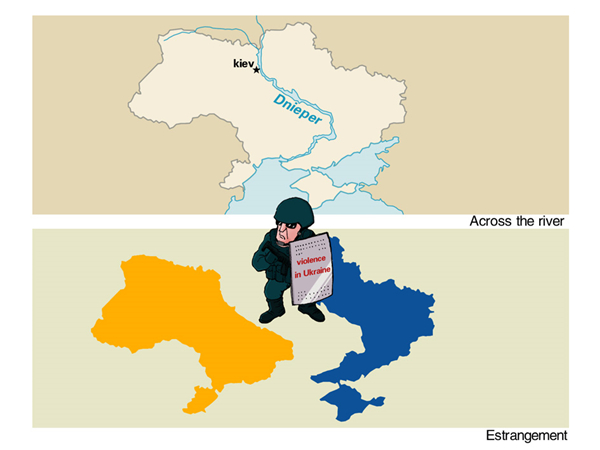China's stance on the Ukraine issue and the role it can play
- By Yu Sui
 0 Comment(s)
0 Comment(s) Print
Print E-mail China.org.cn, April 3, 2015
E-mail China.org.cn, April 3, 2015
|
|
|
The boundary [By Jiao Haiyang/China.org.cn] |
The Ukraine crisis has continued for one year since riots erupted in Kiev Square in February 2014. China's attitude toward the issue and what kind of a role Beijing may play in the crisis is of wide concern.
The issue has placed China in a rather awkward position.
In February 2014, the then Ukrainian president decided to put off the signing of the provisional agreement for joining the European Union. He did not violate the law in doing so, for it was within his functions and powers as the president. At that time, the four parties in the controversy had agreed to hold the presidential election on December 25th, but Kiev Square riots ruined the agreement and overthrew the country's legitimate president. It was impossible for China to approve of the development in the country, which Beijing regarded as violations of the United Nations Charter and the basic norms governing international relations. The Chinese Foreign Ministry spokesman "condemns the extremist violence" in Ukraine. After the country elected a new president, China said it "respects the Ukrainian people's choice."
Then there came the March 16th referendum in Crimea, in which 97 percent of the voters opted for joining Russia. This once again placed China's principles in a kind of dilemma. The heads of state of the two countries had just declared on December 5th, 2013 that China and Ukraine would establish and develop a "strategic partnership," which emphasizes that both sides "firmly support each other on issues concerning state sovereignty, unity, and territorial integrity."
It is widely known under what kind of historical conditions the Soviet Union decided in 1954 to give Crimea, which belonged to Russia at the time, to Ukraine as a gift. It is also well known that Russia had leased the port of Sevastopol from Ukraine for its Black Sea Fleet and the lease will expire by 2017 and that the two countries agreed on April 21, 2010 to extend the lease for another 25 years. That means that before the Ukraine crisis there wasn't the possibility, and conditions, for Russia to take back Crimea and Sevastopol even though Moscow had long suffered from a painful reminiscence of the lost territories. The new crisis created an opportunity for the territories to be "delivered to the door" of Russia. Under these circumstances, all the Chinese Foreign Ministry spokesman could say was that the Chinese government would stick to the diplomatic principles it had insisted upon and the basic norms governing international relations while giving considerations to the historical factors of the Ukrainian issue and the complexity of situation. He also said that it was not without reason that the situation in Ukraine had evolved to become what is today.
Despite the dilemma, China remained impartial in the matter. It repeatedly appealed to all relevant parties to respect the International Law as well as the basic norms governing international relations and settle their disputes through dialogues so as to maintain peace in the region.







Go to Forum >>0 Comment(s)